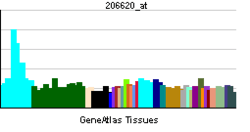GRAP
| GRAP | |||||||||||||||||
|---|---|---|---|---|---|---|---|---|---|---|---|---|---|---|---|---|---|
| Identifiers | |||||||||||||||||
| Aliases | GRAP | ||||||||||||||||
| External IDs | MGI: 1918770 HomoloGene: 4822 GeneCards: GRAP | ||||||||||||||||
| |||||||||||||||||
| RNA expression pattern | |||||||||||||||||
 | |||||||||||||||||
| More reference expression data | |||||||||||||||||
| Orthologs | |||||||||||||||||
| Species | Human | Mouse | |||||||||||||||
| Entrez | |||||||||||||||||
| Ensembl | |||||||||||||||||
| UniProt | |||||||||||||||||
| RefSeq (mRNA) | |||||||||||||||||
| RefSeq (protein) | |||||||||||||||||
| Location (UCSC) | Chr 17: 19.02 – 19.05 Mb | Chr 11: 61.65 – 61.67 Mb | |||||||||||||||
| PubMed search | [1] | [2] | |||||||||||||||
| Wikidata | |||||||||||||||||
| View/Edit Human | View/Edit Mouse |
GRB2-related adapter protein is a protein that in humans is encoded by the GRAP gene.[3][4][5]
This gene encodes a member of the GRB2/Sem5 (C. elegans homolog)/Drk (Drosophila homolog) family. This member functions as a cytoplasmic signaling protein which contains an SH2 domain flanked by two SH3 domains. The SH2 domain interacts with ligand-activated receptors for stem cell factor and erythropoietin, and facilitates the formation of a stable complex with the BCR-ABL oncoprotein. This protein also associates with the Ras guanine nucleotide exchange factor SOS1 (son of sevenless homolog 1) through its N-terminal SH3 domain.[5]
Interactions
GRAP has been shown to interact with Linker of activated T cells.[6][7]
References
- ↑ "Human PubMed Reference:".
- ↑ "Mouse PubMed Reference:".
- ↑ Feng GS, Ouyang YB, Hu DP, Shi ZQ, Gentz R, Ni J (May 1996). "Grap is a novel SH3-SH2-SH3 adaptor protein that couples tyrosine kinases to the Ras pathway". The Journal of Biological Chemistry. 271 (21): 12129–32. doi:10.1074/jbc.271.21.12129. PMID 8647802.
- ↑ Trüb T, Frantz JD, Miyazaki M, Band H, Shoelson SE (Jan 1997). "The role of a lymphoid-restricted, Grb2-like SH3-SH2-SH3 protein in T cell receptor signaling". The Journal of Biological Chemistry. 272 (2): 894–902. doi:10.1074/jbc.272.2.894. PMID 8995379.
- 1 2 "Entrez Gene: GRAP GRB2-related adaptor protein".
- ↑ Zhang W, Sloan-Lancaster J, Kitchen J, Trible RP, Samelson LE (Jan 1998). "LAT: the ZAP-70 tyrosine kinase substrate that links T cell receptor to cellular activation". Cell. 92 (1): 83–92. doi:10.1016/S0092-8674(00)80901-0. PMID 9489702.
- ↑ Perez-Villar JJ, Whitney GS, Sitnick MT, Dunn RJ, Venkatesan S, O'Day K, Schieven GL, Lin TA, Kanner SB (Aug 2002). "Phosphorylation of the linker for activation of T-cells by Itk promotes recruitment of Vav". Biochemistry. 41 (34): 10732–40. doi:10.1021/bi025554o. PMID 12186560.
Further reading
- Welsh M, Songyang Z, Frantz JD, Trüb T, Reedquist KA, Karlsson T, Miyazaki M, Cantley LC, Band H, Shoelson SE (Feb 1998). "Stimulation through the T cell receptor leads to interactions between SHB and several signaling proteins". Oncogene. 16 (7): 891–901. doi:10.1038/sj.onc.1201607. PMID 9484780.
- Zhang W, Sloan-Lancaster J, Kitchen J, Trible RP, Samelson LE (Jan 1998). "LAT: the ZAP-70 tyrosine kinase substrate that links T cell receptor to cellular activation". Cell. 92 (1): 83–92. doi:10.1016/S0092-8674(00)80901-0. PMID 9489702.
- Wenzel J, Sanzenbacher R, Ghadimi M, Lewitzky M, Zhou Q, Kaplan DR, Kabelitz D, Feller SM, Janssen O (Dec 2001). "Multiple interactions of the cytosolic polyproline region of the CD95 ligand: hints for the reverse signal transduction capacity of a death factor". FEBS Letters. 509 (2): 255–62. doi:10.1016/S0014-5793(01)03174-X. PMID 11741599.
- Zhao C, Ma H, Bossy-Wetzel E, Lipton SA, Zhang Z, Feng GS (Sep 2003). "GC-GAP, a Rho family GTPase-activating protein that interacts with signaling adapters Gab1 and Gab2". The Journal of Biological Chemistry. 278 (36): 34641–53. doi:10.1074/jbc.M304594200. PMID 12819203.
- Shiraiwa H, Takei M, Yoshikawa T, Azuma T, Kato M, Mitamura K, Ueki T, Kida A, Horie T, Seki N, Sawada S (2004). "Detection of Grb-2-related adaptor protein gene (GRAP) and peptide molecule in salivary glands of MRL/lpr mice and patients with Sjögren's syndrome". The Journal of International Medical Research. 32 (3): 284–91. doi:10.1177/147323000403200308. PMID 15174222.